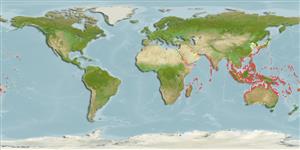Common names from other countries
Environment: milieu / climate zone / depth range / distribution range
Ecologia
marinhas associadas(os) a recifes; intervalo de profundidade 0 - 60 m (Ref. 128797). Tropical; 42°N - 35°S, 20°E - 158°W
Indo-Pacific: East Africa to Micronesia and Samoa, north to southern Japan, south to New South Wales. Replaced by Arothron diadematus in the Red Sea (Ref. 37816, Ref. 84159).
Tamanho / Peso / Idade
Maturity: Lm ? range ? - ? cm
Max length : 33.0 cm TL macho/indeterminado; (Ref. 9710)
Espinhos dorsais (total) : 0; Raios dorsais (total) : 10 - 11; Espinhos anais: 0; Raios anais : 10 - 12. Body covered with prickles (Ref. 559) and with large black spots (Ref. 4919).
Inhabit coastal to outer reef crest and slopes with rich invertebrate growth. Sometimes solitary (Ref. 90102). Adults often in pairs (Ref. 48637). Feed on corals (usually Acropora tips), crustaceans, mollusks, sponges, tunicates and algae (Ref. 2334). Generally common (Ref. 9710).
Ciclo de vida ou comportamento de acasalamento
Maturities | Reprodução | Spawnings | Egg(s) | Fecundities | Larvas
Randall, J.E., G.R. Allen and R.C. Steene, 1990. Fishes of the Great Barrier Reef and Coral Sea. University of Hawaii Press, Honolulu, Hawaii. 506 p. (Ref. 2334)
Status na Lista Vermelha da UICN (Ref. 130435)
CITES (Ref. 128078)
Not Evaluated
Ameaça para os humanos
Poisonous to eat (Ref. 4690)
Uso pelos humanos
Pescarias: espécies comerciais; Aquário: Aquários públicos
Ferramentas
Relatórios especiais
Baixar XML
Fontes da internet
Estimates based on models
Preferred temperature (Ref.
115969): 24.7 - 29.3, mean 28.4 (based on 3101 cells).
Índice de diversidade filogenética (Ref.
82804): PD
50 = 0.5000 [Uniqueness, from 0.5 = low to 2.0 = high].
Bayesian length-weight: a=0.03715 (0.01569 - 0.08798), b=2.87 (2.70 - 3.04), in cm Total Length, based on LWR estimates for this Genus-body shape (Ref.
93245).
Nível Trófico (Ref.
69278): 3.4 ±0.5 se; based on diet studies.
Resiliência (Ref.
120179): Elevada, tempo mínimo de duplicação da população menor que 15 meses (Preliminary K or Fecundity.).
Fishing Vulnerability (Ref.
59153): Low vulnerability (23 of 100).
